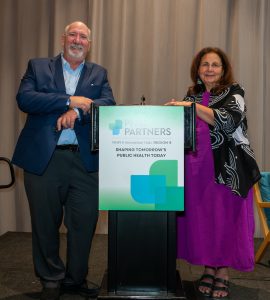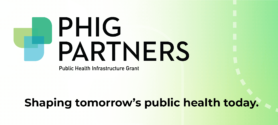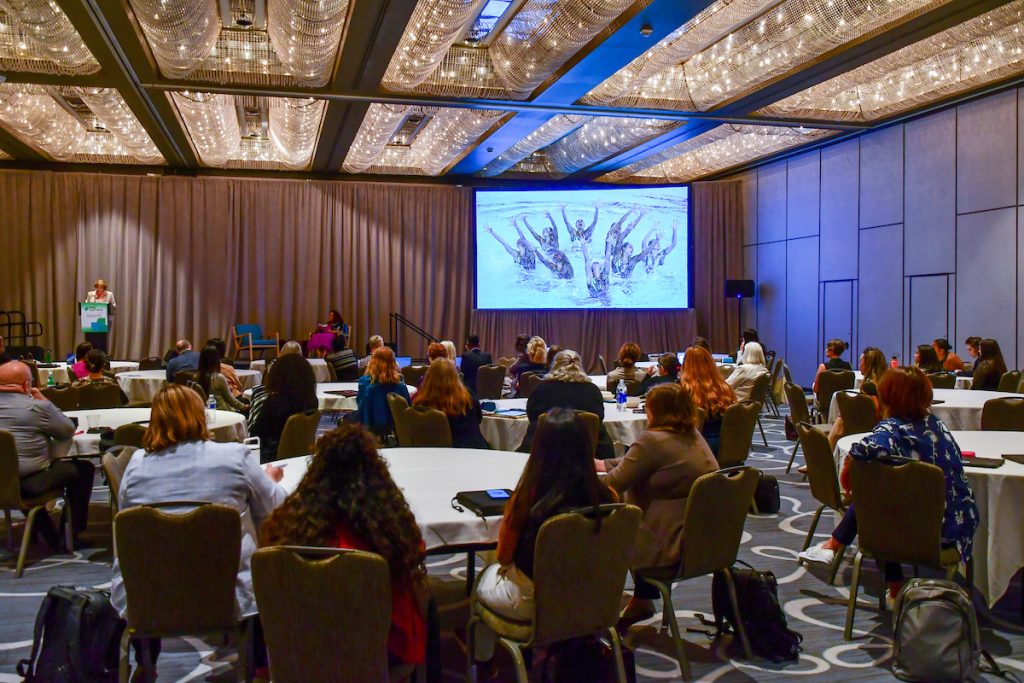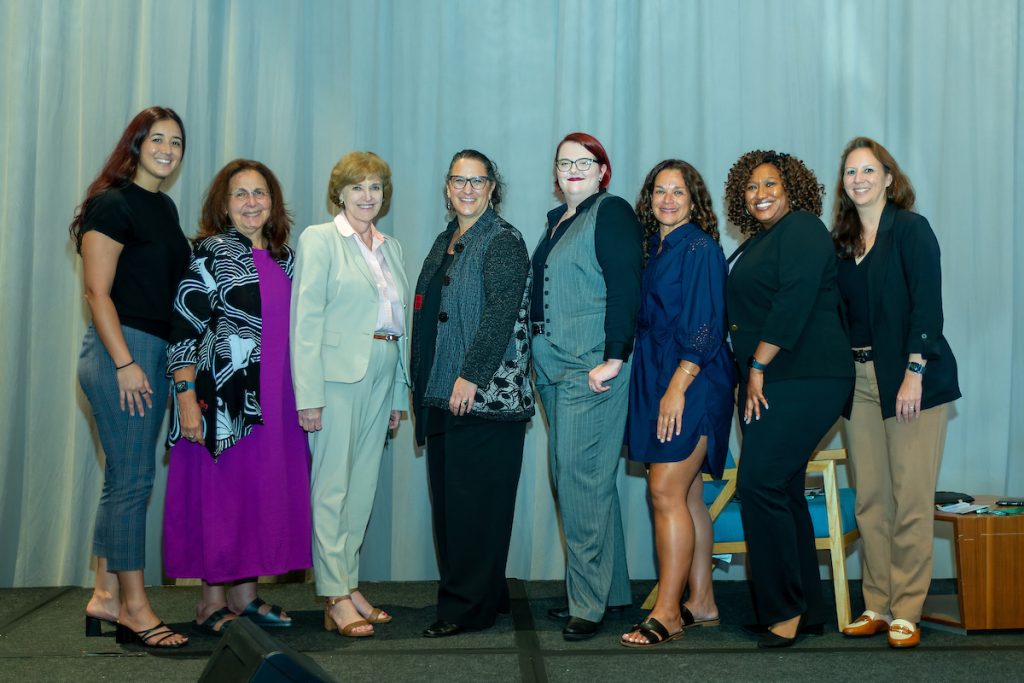Region 9 PHIG Convening Drives Progress through 1:1 Consultations, Peer Learning, and Region-Specific Data
- By: Chloe Lake
- Date
On September 4 and 5, PHI Center for Health Leadership & Impact (CHLI) hosted the first in-person Region 9 PHIG Hub Convening in Long Beach, CA, in partnership with the National Network of Public Health Institutes (NNPHI). CHLI, a program of Public Health Institute, serves as NNPHI’s PHIG Hub for Region 9, and provides technical assistance for PHIG recipients in California, Arizona, Nevada, Hawai’i, American Samoa, the Commonwealth of the Northern Mariana Islands, the Federated States of Micronesia, Guam, the Republic of the Marshall Islands, and the Republic of Palau.
The event brought together over 100 participants representing 30 Region 9 PHIG direct recipient and sub-recipient health departments, as well as regional and national partners and experts. Attendees included state, county, and city health department employees as well as representatives from organizations who provide training and technical assistance to PHIG recipients, including:
- Hawai’i Public Health Institute
- CDC Foundation
- PHI Berkeley Media Studies Group
- PHI Public Health Alliance of Southern California
- National Association of City and County Health Officials (NACCHO)
- Data Across Sectors for Health (DASH)
- Hillcrest Advisory
- Innovate Well Group
- Western Region Public Health Training Center
- CDC’s National Center for State, Tribal, Local, and Territorial Public Health Infrastructure and Workforce
- PHIG National Partners: National Network of Public Health Institutes (NNPHI), Association of State and Territorial Health Officials (ASTHO), and the Public Health Accreditation Board (PHAB)
CONVENING OUTCOMES:
Connection and networking were top priorities for this year’s convening. Region 9 PHIG recipients had been requesting opportunities to learn from their peers and share successes and challenges related to PHIG. The convening offered opportunities for health departments to connect and learn from one another, utilizing interactive workshops, peer learning groups, and plenary sessions featuring health department leaders from the region.
“The engagement from participants was fantastic to see,” stated Rachel Fogleman, PHIG Program Coordinator with CHLI. “People were asking thoughtful questions, openly sharing resources, and all around connecting with one another. It was great having the sub-recipient health departments participate, as many are looking for ways to partner and share their own expertise, too.”
“Creating an environment within the peer learning groups for participants to actively foster connections and share resources was one of our major accomplishments. This convening also provided a unique opportunity for health departments to receive consultations with PHIG National Partners to work through practical applications of a variety of topics directly related to their work with the grant,” stated Shaena Rouse, Senior Program Manager.
CONVENING HIGHLIGHTS:
1:1 Consultations with Subject Matter Experts and CDC PHIG Project Officers: Participants had the opportunity to sign up for 20-minute consultations around accreditation/reaccreditation, strategic planning and systems challenges, workforce development, and recruitment, hiring, and retention. The consultations helped participants to get customized support and ask questions, discuss next steps of their process, review documents, and request future technical assistance.
PHorecasting the Future of Public Health while Gaining New Perspectives from the Past: The opening and closing plenary speakers brought messages about actionable change for the future of public health. Judith Monroe, CEO and President of the CDC Foundation, kicked off the convening by sharing her thoughts on how PHIG can be leveraged to generate radical improvem ent within public health. At the closing of the event, Michael Osur, retired Assistant Director of the Riverside County Department of Public Health, shared his experiences with using innovative and disruptive approaches to generate change across sectors for the good of public health in his community.
ent within public health. At the closing of the event, Michael Osur, retired Assistant Director of the Riverside County Department of Public Health, shared his experiences with using innovative and disruptive approaches to generate change across sectors for the good of public health in his community.
Stories from the Field: Transformative Work within Region 9 Health Departments: Day two was anchored with a panel discussion moderated by Dr. Carmen R. Nevarez. Sara Bosse, Director of the Madera County Department of Public Health, and John Shoemaker, Manager and Principal Investigator of PHIG at the Maricopa County Department of Public Health, shared how they are transforming the infrastructure and culture of their health departments – shifting from a mindset of lacking to one of abundance.
Seven Workshop Breakout Sessions on PHIG Hot Topics: Technical assistance partners from across the country presented topics picked by participants prior to the convening. Topics included data modernization and visualization, internal communications planning, using communication strategies to build trust within communities, navigating federal procurement and contracting, and retention and succession planning. SME’s and Partners TA groups included:
- PHI Berkeley Media Studies Group
- PHI Public Health Alliance of Southern California
- Hillcrest Advisory
- Innovate Well Group
- DASH
- NACCHO
- ASTHO
- PHAB
PHIG Performance Measure Peer Learning Groups: The Hawai’i Public Health Institute, PHAB, ASTHO, and the Innovate Well Group facilitated four peer learning groups focused on hiring, retention, procurement and contracting, and accreditation/reaccreditation. The learning groups provided participants peer to peer support and the opportunity to share successes and lessons learned related to the PHIG performance measures.
Public Health Core Competency and Training Preferences in Region 9: The Western Region Public Health Training Center shared comprehensive data on public health core competency gaps and training preferences and barriers among health departments within Region 9. The available report produces data that breaks down gaps based on competency domains and staff tiers.
RESOURCES AND NEXT STEPS
“We look forward to partnering on the transformative work ahead,” said Karya Lustig, Director Strategy and Implementation, CHLI, sharing that the Region 9 Hub at CHLI already has over a dozen technical assistance offerings planned through February 2025. Health departments in Region 9 and beyond can find out more about upcoming events by signing up for the Region 9 PHIG newsletter.
LEARN MORE
More information and resources related to the Public Health Infrastructure Grant can be found at PHInfrastructure.org. More information about PHI can be found at PHI.org.
This work is supported by funds made available from the Centers for Disease Control and Prevention (CDC) of the U.S. Department of Health and Human Services (HHS), National Center for STLT Public Health Infrastructure and Workforce, through OE22-2203: Strengthening U.S. Public Health Infrastructure, Workforce, and Data Systems grant. The contents are those of the author(s) and do not necessarily represent the official views of, nor an endorsement, by CDC/HHS, or the U.S. Government.



 Subscribe To Our Communications
Subscribe To Our Communications